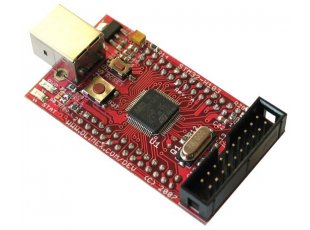I've been a big fan of crosstool-ng ever since I found out that Dan Kegal's crosstool scripts idea was being continued.
I picked up one of these boards, an Olimex STM32-H103, because I'm putting together a custom PCB with an STM32F103 on it and didn't want to be bringing up the toolchain at the same time as debugging the hardware. Starting with this board means starting with a known working STM32F103 board.
Steps
- Install 'gcc-multilib' package. If you don't have this you'll get some odd errors when building the toolchain such as:
- Get crosstool-ng. I cloned mine from the repository and built it locally.
- Ran 'ct-ng menuconfig' and enable:
I picked up one of these boards, an Olimex STM32-H103, because I'm putting together a custom PCB with an STM32F103 on it and didn't want to be bringing up the toolchain at the same time as debugging the hardware. Starting with this board means starting with a known working STM32F103 board.
Steps
- Install 'gcc-multilib' package. If you don't have this you'll get some odd errors when building the toolchain such as:
[INFO ] =================================================================
[INFO ] Installing binutils for host
[INFO ] Installing binutils for host: done in 142.17s (at 11:46)
[INFO ] =================================================================
[INFO ] Installing pass-1 core C compiler
[ERROR] checking dynamic linker characteristics... checking whether getchar_unlocked is declared... configure: error: Link tests are not allowed after GCC_NO_EXECUTABLES.
[ERROR] checking whether putchar_unlocked is declared... make[1]:
*** [configure-zlib] Error 1
[ERROR]
[ERROR] >>
[ERROR] >> Build failed in step 'Installing pass-1 core C compiler'
[ERROR] >> called in step '(top-level)'
[ERROR] >>
[ERROR] >> Error happened in: CT_DoExecLog[scripts/functions@257]
[ERROR] >> called from: do_cc_core_backend[scripts/build/cc/gcc.sh@448]
[ERROR] >> called from: do_cc_core_pass_1[scripts/build/cc/gcc.sh@101]
[ERROR] >> called from: main[scripts/crosstool-NG.sh@624]
[ERROR] >>
[ERROR] >> For more info on this error, look at the file: 'build.log'
[ERROR] >> There is a list of known issues, some with workarounds, in:
[ERROR] >> 'docs/B - Known issues.txt'
[ERROR]
[ERROR] (elapsed: 13:04.23)
[13:05] / make: *** [build] Error 2
- Get crosstool-ng. I cloned mine from the repository and built it locally.
- Ran 'ct-ng menuconfig' and enable:
- 'Build a multilib toolchain'. This will give the toolchain the option to compile for several different types of ARM processors. Apparently it is required because the instruction sets are incompatible, along with the hardware vs. software fpu support. You can build without this option but it will limit the types of processors that gcc will support.
- 'Target architecture' to 'ARM', of course
- Run 'ct-ng build' to build the toolchain.
- If everything works then you should have a toolchain

Comments
Post a Comment